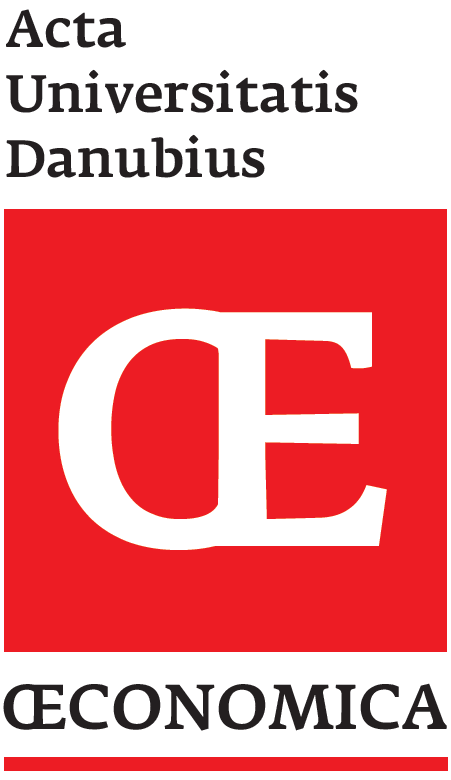About the Journal
|
|
Recognized by CNCSIS B+ Category Author Guidelines |
Acta Universitatis Danubius. Œconomica Journal is included in the following international databases and catalogs: CEEOL; EBSCO Publishing; EconPapers/RePEc; IDEAS/RePEc; Index Copernicus; ProQuest.
Focus and Scope
The Faculty of Economic Sciences of the Danubius International University, Romania, has started publishing a scientific review: Acta Universitatis Danubius. Œconomica, since 2005, in English and French language, that is distributed both nationally and internationally and its main domain of study in economics. The theme of the review is very diverse. The scientific published articles encompass economic areas, from general economic theory, business administration, commerce, economic analysis, international economic relations to economic mathematics and informatics, and history of economics. The review presents theoretical studies from all fields of economic activity, combining theoretical approaches with the presentation of practical cases, providing well-documented answers to a wide range of issues encountered in the economic environment. The review represents the theoretical and empirical studies in economic areas and it is written by authors that are mainly from the academic world, but also researchers, master’s students, managers, entrepreneurs, business people, etc.
Fee for publishing in our journal
Payment methods
Payments can be processed through PayPal services or bank wire.
The details are sent as soon as the article is accepted.
Peer Review Process
The journal is a blind peer-review journal. All research articles in this journal undergo rigorous peer review, based on initial editor screening and anonymous refereeing by at least two anonymous referees.
The blind peer review process is essential in terms of quality as the articles that have undertaken the process are considered highly credible because they have undergone scrutiny by experts with particular knowledge in the topic. The primary aims of blind peer review are 2-fold: to decide whether or not an article should be published (based on quality and relevance to the journal), and to improve the article before publication.
Internal Peer Review Process
All submissions first go through an internal peer-review process. Each submission is reviewed by the editor assigned by the editorial secretary who makes an initial decision to send the manuscript out for peer review or to reject without external review. Articles can be rejected at this stage for a variety of reasons such as similarity with a recently published article, the topic is outside of the scope of the Journal, little new information is provided, important flaws in the scientific validity, or an unprofessional presentation. This process normally takes a week. If the editor believes the article may be of interest to our readers, it is then sent out for external blind peer review.
External Blind Peer Review Process
The editors upon consulting the editorial board identify potential reviewers based on their expertise in the field, rigor, and scientific methodology. Two reviewers are thus identified for each submitted manuscript. The reviewers are selected also by selecting from our database reviewers whose past contributions recommend them by their quality reviews and fit into the time frame.
Potential reviewers are contacted by the editorial secretary about their availability and interest in reviewing. Inquiries to reviewers are sent by e-mail, which includes the manuscript abstract and the assignment deadline. When prospective reviewers agree to serve, they are permitted access to the manuscript and reviewing instructions, without however being permitted to know the author(s)' name. The reviewers’ names are also unknown to the manuscript author(s). The time frame for making their decision is a maximum of three weeks. After the reviewing process, authors receive the decision from the editorial board as follows: accepted, accepted with slight changes, revise and resubmit, rejected.
Open Access Policy
This journal provides immediate open access to its content on the principle that making research freely available to the public supports a greater global exchange of knowledge.
In case of multiple submissions of the same authors or coauthors of different articles, the journal reserves the right to choose only ONE (1) accepted paper to publish per issue.
PLAGIARISM CHECK
All articles are verified by anti-plagiarism software, Turnitin, before being submitted for peer review. The recommended similarity percentage is 20%.
Open Access Statement
Danubius Journals Platform publishes fully open access journals, which means that all articles are available on the internet to all users immediately upon publication, without requiring a subscription to the journal. The journals are online first which allows authors, within a set deadline, to revise their posted article before printing. All the articles undergo blind and editorial peer-review and quality control.
The articles that are published in the journal are distributed under CC BY-NC license. Users can distribute, remix, tweak, and build upon our articles, even commercially, as long as they are credited for the original creation. 
Benefits of open access for authors include:
- Free access for all users worldwide;
- Authors retain copyright to their work;
- Increased visibility and readership worldwide.
This journal provides immediate open access to its content on the principle that making research freely available to the public supports a greater global exchange of knowledge.


